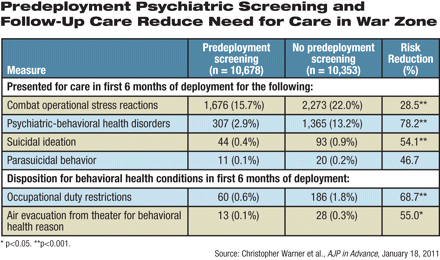Identifying U.S. Army soldiers in treatment for mental health diagnoses before they deployed and then coordinating their care while in Iraq reduced the number who sought treatment there, according to a new study published online January 18 in the American Journal of Psychiatry's AJP in Advance.
The study sought to examine the effects of new mental health standards for deployment developed by the Department of Defense in 2006 following media reports that the Army was sending soldiers with mental disorders into combat zones.
Those standards barred troops with schizophrenia or bipolar disorder from deploying. They also set conditions for deployment for personnel with other conditions depending on the severity, stability, and treatment requirements of their illness. In 2009, Congress passed legislation requiring mental health screening prior to deployment.
Despite these mandates, military health officials had no data from controlled studies on such predeployment evaluation and its relationship to follow-up care in war zones, according to Maj. Christopher Warner, M.C., and Col. George Appenzeller, M.C., two of the five co-authors of the paper, in an interview with Psychiatric News. Warner is a psychiatrist and family physician, and Appenzeller is an emergency room physician.
Although the authors use the word "screening" in their article to describe the evaluation process, they mean "identifying those soldiers who are already under care," rather than in the usual sense of identifying asymptomatic individuals, said Warner, in an interview.
"The ‘screening’ questions identified a very small number of soldiers who could not deploy, but most importantly, it ensured that the 700-plus soldiers who were already under care and fit to deploy (including more than 300 on medications) received continued services in-theater," said Warner. This was a first step in coordinating care by having unit behavioral health and primary care professionals collaborate closely on regular follow-up of soldiers while in Iraq, and ensuring that soldiers had continued access to their medications while there.
By virtue of its timing just after the policy was issued, the planned deployment to Iraq of the Third Infantry Division from Fort Stewart, Ga., set up a natural experiment for researchers.
Three brigades—about 10,000 soldiers—already attached to the division were screened with a 15-question checklist developed by the Department of Defense. The screening took place during a standard predeployment evaluation with a primary care clinician. Soldiers recording a positive response to any of the questions then met immediately with a psychiatrist, psychologist, or clinical social worker for a mental health examination.
Those assessments were meant to determine any deployment-related limitations presented by the soldier's condition or medications (see table).
Soldiers being treated for psychosis or bipolar disorder did not deploy, nor did those taking certain drugs including lithium, valproic acid, or antipsychotics.
However, those stabilized on other psychiatric medications for at least three months were allowed to deploy. Medical officers discussed with unit commanders the status of troops who were otherwise physically or psychologically fit to deploy but who had been on medications for less than three months. Once the unit commanders heard the explanation of each soldier's condition and the care it required, they could request a waiver permitting him or her to deploy.
All actions were documented in each soldier's electronic medical record. Arrangements were also made to coordinate the soldier's care with unit medical officers while in Iraq.
Three brigades from other posts were attached to the Third Division, but for technical reasons were screened only with questions asking whether they had seen a mental health professional in the previous year or were taking any psychotropic drugs.
In the three fully screened brigades, 819 soldiers out of a total of 10,768 required a mental health evaluation. Of those, 472 had been under the care of a psychiatrist or mental health professional during the prior year but were not taking medications, and 347 were taking a psychotropic medication.
In that latter group, 96 soldiers required a waiver to be able to deploy. All received the waiver, and all completed their tours of duty successfully, the authors said.
Forty-eight soldiers were not cleared for deployment but were linked to care at their home bases. The researchers did not track their outcomes, but some may have served the unit while remaining at Fort Stewart, and some may have been asked to leave the Army.
During the deployment, Army medical personnel in Iraq closely tracked all clinical contacts of soldiers identified with mental health diagnoses.
Rates of combat operational stress reactions, psychiatric or behavioral health disorders, and suicidal ideation were lower in the screened units than among the three unscreened brigades (see table).
Prior screening programs were designed to predict resilience capacity, said Warner.
"The present intervention focused on who required care and how to link them to care to stay successful," he said. "Screening usually means catching new cases, but this focused on individuals already in care so that they could continue to get care in theater by building a stronger link between soldier and doctor," said psychiatrist Charles Hoge, M.D., another co-author.
That soldiers were willing to disclose their mental health status was a hopeful sign, said the authors.
"They have overcome stigma by identifying themselves as needing help," said Warner. "We can't let them down by not letting them get care."
Rapid changes are occurring now in deployment screening for PTSD, depression, and other mental health problems, he said. In response to new legislation, all screening policies are in the process of being standardized as part of the Army Comprehensive Behavioral Health System of Care.
A second, unrelated study by Gerald Larson, Ph.D., of the Naval Health Research Center in San Diego, and others published in the January Psychiatric Services found that 29 percent of 1,078 military patients seen in an Iraqi war zone had a psychiatric diagnosis in their medical records. The most common diagnoses that appeared both before and during deployment were attention-deficit/hyperactivity disorder (57 percent of those diagnosed), anxiety disorders (44 percent), mood disorders (38 percent), and adjustment disorders (32 percent).

